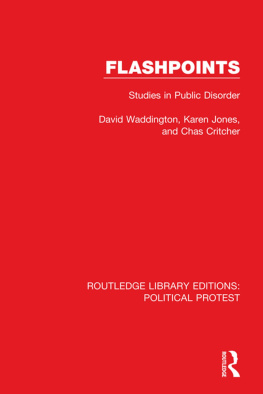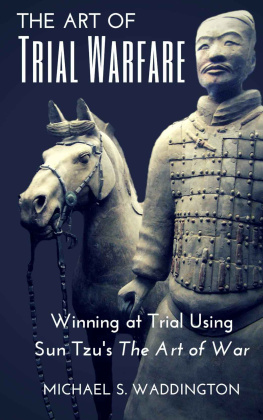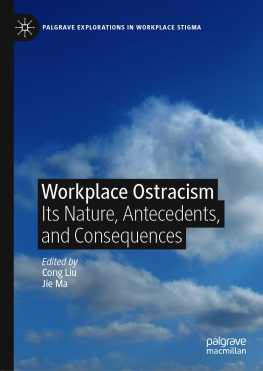First published by Willan Publishing 2006
This edition published by Routledge 2013
2 Park Square, Milton Park, Abingdon, Oxon OX14 4RN
711 Third Avenue, New York, NY 10017 (8th Floor)
Routledge is an imprint of the Taylor & Francis Group, an informa business
2006 P.A.J. Waddington, Doug Badger and Ray Bull
All rights reserved; no part of this publication may be reproduced, stored in a retrieval system, or transmitted in any form or by any means, electronic, mechanical, photocopying, recording or otherwise without the prior written permission of the Publishers or a licence permitting copying in the UK issued by the Copyright Licensing Agency Ltd, 90 Tottenham Court Road, London W1P 9HE.
ISBN-13: 978-1-84392-168-4
ISBN-10: 1-84392-168-5 Hardback
British Library Cataloguing-in-Publication Data
A catalogue record for this book is available from the British Library
Typeset by GCS, Leighton Buzzard, Beds
Project management by Deer Park Productions, Tavistock, Devon
Preface
As I was writing this text on behalf of my collaborators and myself, an incident occurred in the university hall of residence of which I was the warden. A student resident had returned a week before term began without giving prior notice and in any event the hall was occupied by a conference. When the porter explained that the student could not be admitted to the hall, his father, who had transported him and a car-load of possessions, became agitated. Such was his agitation that the hall secretary summoned me, but by the time of my arrival the resident and his father had left. The porter found it rather amusing and speculated that the father was likely to direct his anger towards his son for bringing him on such an unnecessary jaunt.
Three days later I was in my study when the phone rang. Again, it was the hall secretary's alarmed voice asking me to go to the hall foyer where the resident and his father had returned and were now engaged in an altercation with staff. As I walked into the foyer I could hear the father's raised voice and saw him standing directly in front of the young man who is the deputy hall manager. He was making a stabbing gesture towards the deputy's chest with his right hand. The deputy drew attention to my arrival and the father glanced briefly in my direction, but returned his attention to the deputy. I asked what the problem was and the father turned and angrily said That's no way to speak to me! What's the problem?! He then explained that on the previous visit he and his son had been led to believe that his son could return on this day, but now he had learnt that his son would have to pay an additional daily rent for occupying a room during what remained of the vacation. Well, explained hardly does justice to the spluttered and incoherent string of allegations that fell from the father's lips. As he spoke, the father started to use the same jabbing gesture that he had earlier employed when addressing the deputy. I placed my hand over his and gently lowered his arm to indicate that I was not willing to allow him to continue making this gesture.
The conversation with the resident's father was proving fruitless and since he was not the contracting party I said that I would talk to his son, who stood quietly a few feet away. He repeated that he and his father had been told he could return later in the week, but no mention had been made of an additional payment. However, before this conversation could progress much further the father interrupted and he was becoming progressively agitated. After uttering a few angry complaints about the management of the hall, the father declared that he and his son were leaving. They began walking towards the exit and I followed a few feet behind. The father turned towards me and asked rhetorically, Who do you think you are? A bouncer? He then threatened to have me if I laid a hand on him. As he went through the exit he declared that if he saw me in the city where he lived he would have me. As they drove away, the car paused near the entrance and the father glared towards the foyer.
Anticipating that the father might complain about his and his son's treatment, I instructed all the staff who were present to write down exactly and fully what they had seen and heard. For the remainder of the day, this incident was recalled, analysed and condemned by various members of staff. One of them who had been on the margins of the incident came to see me in tears, for it evoked feelings from her previous employment. Staff were distressed and angry. They felt traduced by what they regarded as the unfounded allegations hurled around so freely by the resident's father. They reassured me that they had done nothing to foster the false impression that the resident and his father harboured. They speculated about the father's motives and what he might do.
The following day news was received that the father had indeed contacted a central office in the university regarding the incident. Whilst he had generally complained, he had been more concerned that his son should not be discriminated against because of his altercation with staff. A few days later when all students returned for the beginning of term, the father approached the porter who had witnessed the earlier episode and thanked him for everything you've done for his son. Just a brief interlude in paradise!
It is incidents such as this that are the focus of this book. The reader may well ask why such commonplace behaviour has devoured the attention of a criminologist, a forensic psychologist and a senior social work lecturer. At the outset of the research on which this book is based, it was not our intention to focus on such incidents. Our concern had been aroused by the burgeoning of workplace violence and its apparent concentration in certain occupations, most notably the caring professions of health care, mental health and social work. It was our aim to explore fully the experience of being exposed to such violence and understand the meaning that victims gave to it. What we discovered in the course of fieldwork was the mundane reality of workplace violence: clients, patients, customers, suspects and their respective companions become occasionally angered by what they consider poor service or injustice. They express that anger by raising their voice, making complaints and allegations, perhaps uttering more or less specific threats. Rarely, the incident will result in some physical contact that may amount to an assault.
If physical violence is relatively rare, why do such incidents merit examination and analysis? Whether physical injury is caused or not, employees like the porters and administrative staff of the hall of residence often find such episodes deeply disturbing. Staff in the hall of residence remained agitated for the remainder of the day in which the incident occurred. There was apprehension among some staff about what would happen if and when the father returned to bring his son to begin the academic term. Long after the incident had occurred staff recalled and discussed it. For me, what had hitherto been an academic curiosity became an experiential reality.
In the pages that follow we will show the breadth of what is described as workplace violence: from life-threatening incidents and serious physical injury to angry expressions of annoyance. We seek to analyse the experiences of those we interviewed; to understand the meanings that they gave to those experiences; and to consider the implications of our analysis for practice and policy. We believe that this will challenge common misconceptions misconceptions that we shared when we embarked on this venture.












